Tooth Extractions Lakewood
Protect Your Smile and Remove Problematic Teeth
There’s nothing quite like your natural teeth. That’s why our team of dentists does everything they can to keep your smile happy and healthy for life. Unfortunately, there are times when a tooth becomes so damaged, decayed, or infected that it poses a threat to the rest of your teeth and even your overall health. In these cases, we can protect your smile and remove problematic teeth with a quick, comfortable tooth extraction at Lakewood Complete Dentistry. If you or a loved one has a severely painful or damaged tooth, don’t hesitate to call us right away for the fast care you need.
Why Choose Lakewood Complete Dentistry for Tooth Extractions?
- Dental Savings Plan Available to Lower Out-of-Pocket Expenses
- Dentists Who Care About Providing Compassionate & Gentle Dentistry
- Innovative Dental Technologies for Comfortable Procedures
When Is a Tooth Extraction Recommended?
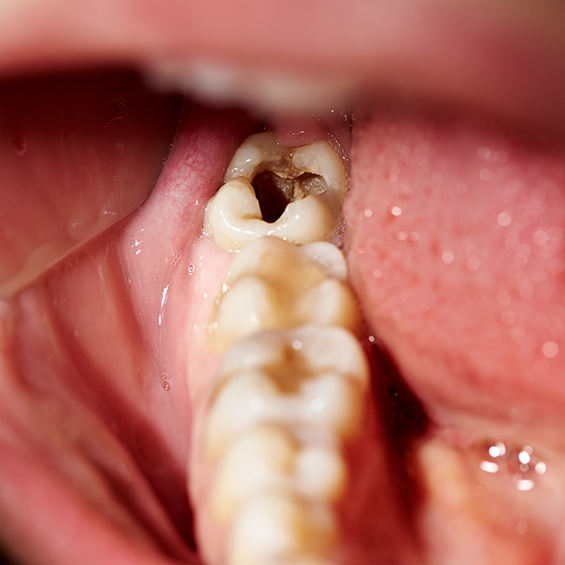
Tooth extractions in Lakewood are certainly not recommended lightly. We will only recommend one if it’s absolutely necessary for your health and there are no other viable treatments, such as a dental crown or root canal therapy. Tooth extractions are usually used when:
- A tooth is damaged beyond repair.
- A tooth is so decayed or infected that it can’t be saved.
- Gum disease has damaged the jawbone and connective tissues that support a tooth.
- There isn’t enough room in the mouth for a new denture or orthodontic treatment.
- A baby tooth is preventing a permanent tooth from coming in.
What Is the Tooth Extraction Process Like?
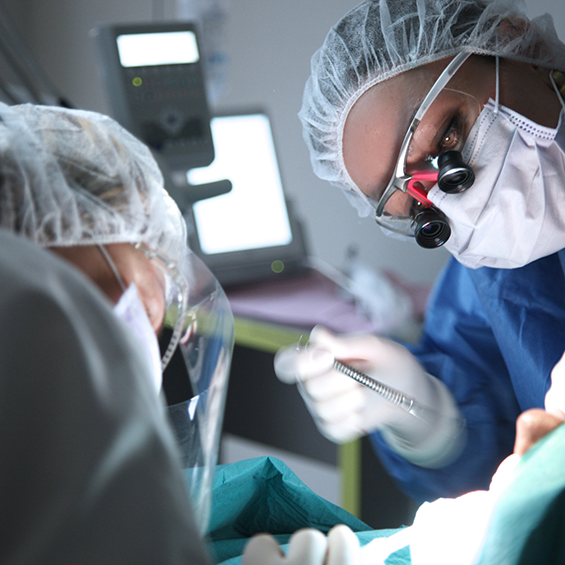
First, we will work quickly to get you out of pain as soon as possible by administering local anesthesia to numb the area. This reliable numbing medication will ensure you stay comfortable throughout the entire process. Once it’s in full effect, we’ll use a small device called a dental elevator to carefully lift the tooth from its socket. Next, we’ll carefully grasp the tooth with a special pair of forceps and gently rock it back and forth. Eventually, it will break free of the remaining supportive tissues and slip out of the socket entirely.
Dr. Artino will then carefully rinse and disinfect the area to ensure that your mouth is completely clean. Typically, he’ll stitch the gums closed with dissolvable sutures to cover the extraction site and place a piece of clean gauze over it. Thanks to the local anesthetic that we will apply at the beginning of your treatment, you should only feel occasional pressure throughout the entire process.
Tips for Healing After Tooth Extraction

Before you leave our office, we’ll give you specific instructions on how to care for your smile after your tooth extraction procedure. For a fast and comfortable recovery, we will typically suggest that you:
- Relax and avoid physical, strenuous activities for at least 24 hours.
- Take prescribed pain medication or recommended over-the-counter pain relievers as instructed.
- Reduce swelling by applying an ice pack or cold compress for 10 minutes on then 10 minutes off.
- Rinse with warm saltwater several times a day to keep bacteria and infection at bay.
- Stick to a diet of soft, nutritious foods for at least 48 hours, and remember to stay hydrated.
- Refrain from smoking, don’t drink through a straw, and remember to brush the extraction site gently.
If you suddenly find yourself with an intense toothache or damaged tooth, don’t hesitate to get in touch with your Lakewood emergency dentist. We’ll do everything we can to get you out of pain right away and protect your oral health.
Understanding the Cost of Tooth Extractions
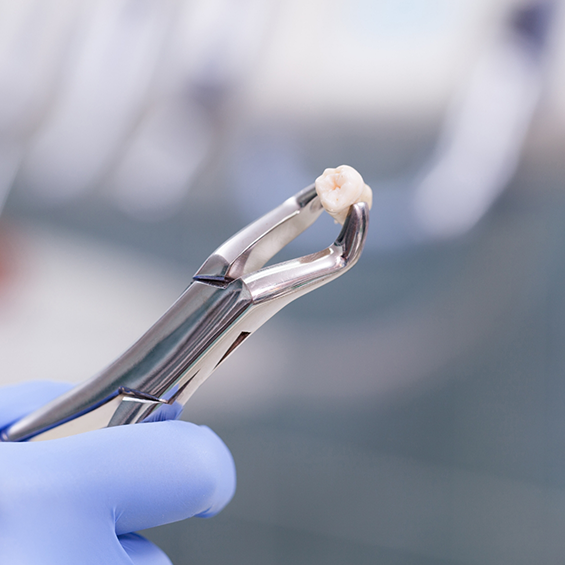
When you are scheduled for a tooth extraction, the last thing you want is another thing to worry about. For that reason, we make it a point to keep the financial component of your dental care as simple as it can be.
This includes giving you a thorough breakdown of what your dental care is going to cost. We’ll give you a full estimate for the price of your services when we meet you in person but until then, here’s what you should know about the typical cost of a tooth removal.
Factors That Can Affect Tooth Extraction Cost
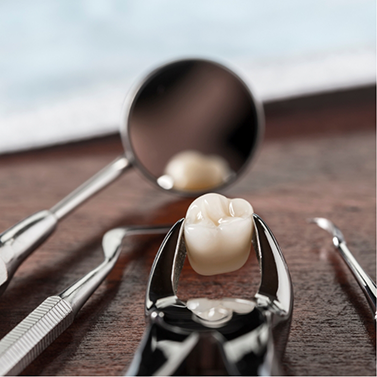
The reason we can’t tell you what your tooth extraction is going to cost without talking to you first is that the price of this procedure varies from patient to patient depending on a few factors. Ultimately, the more complex your procedure is, the longer it will take and the more it will cost. There are a few variables that can make tooth extraction more or less complex:
- The type of tooth being removed
- Where the problematic tooth is located in the mouth
- How many teeth will need to be extracted
- Whether the tooth you’re extracting is impacted or not
In some circumstances, a sufficiently complicated tooth extraction will require the aid of an oral surgeon. We’ll connect you with one of the specialists in our network who will have their own rates for their services. You should also incorporate the cost of your tooth replacement into your budget; we’ll tell you more about what methods are available to you when we meet you in person.
Does Dental Insurance Cover Tooth Extractions?
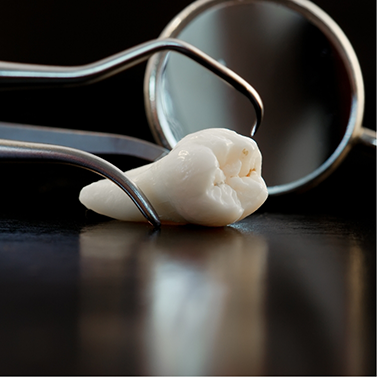
While oral surgery isn’t necessarily always covered by insurance, tooth extractions done to treat serious medical issues will typically be paid for. While the details of this vary from plan to plan, many will cover around 50% of the total cost of your tooth extraction.
We’ll be happy to help you consult with your dental plan so that you can get a better sense of what you can expect your treatment to cost.
Other Options for Making Tooth Extractions Affordable
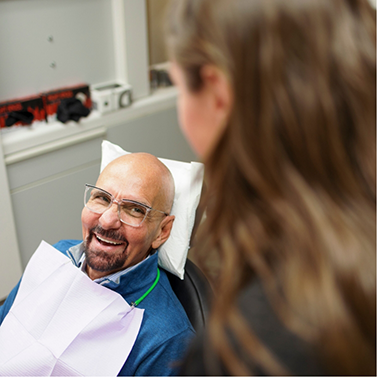
Of course, some patients need a tooth extraction who have yet to meet their deductible or who are uninsured altogether. We want care to be available and affordable for every patient who needs treatment, which is why we offer alternative options outside of insurance that can make your care fit your budget.
We frequently work with CareCredit, which is a health and wellness financing firm that can allow you to split the cost of your services across several months. If you want to hear more about what you can do to make your tooth extraction affordable, make an appointment with us and we’ll be happy to talk to you.
Tooth Extractions FAQs
How Should I Prepare for My Tooth Extraction?
Before your extraction, it’s important to discuss your medical history with our dentist as well as provide a complete list of any medications you’re currently taking. Being honest about this information will help our team plan to make your procedure as safe and comfortable as possible. We’ll let you know whether you should temporarily stop taking any medications before or after your extraction, and we’ll also go over which foods you should and shouldn’t eat while recovering. You should arrange for a trusted family member or friend to drive you to and from your appointment, as it can take several hours for the anesthesia to fully wear off.
What Are My Options for Replacing a Missing Tooth?
If you need to replace your missing tooth after an extraction, there are several options to choose from depending on your specific oral health needs, jawbone density, and budget. These options include dental bridges, dentures, and dental implants.
- A dental bridge can replace a single tooth or multiple consecutive teeth by anchoring several artificial teeth onto two of your remaining pearly whites via dental crowns.
- A full denture rests on the gums to bring back an entire row, while a partial denture fills the gaps left behind by several lost teeth.
- Dental implants are often considered the gold standard of tooth replacement, as they’re surgically placed in the jaw and deliver greater longevity and stability.
Your dentist in Lakewood can let you know which of these solutions would best suit your needs.
How Soon After a Tooth Extraction Can I Get Dentures?
Following the removal of a tooth, your gums and jawbone will need time to heal before it can be replaced. In most cases, it takes six to eight weeks until your gums have recovered enough to begin the process of getting dentures. If we were to start before that point, your prosthetic may end up not fitting correctly, as we would have taken impressions before your gums had settled into their normal shape after healing.
Can I Smoke After Getting a Tooth Extracted?
All tobacco products, including cigarettes, cigars, chewing tobacco, and even e-cigarettes, can delay the healing process significantly. Therefore, you should avoid using these products after your tooth extraction. We typically recommend abstaining from tobacco for at least five days following your procedure, but two full weeks is even more ideal. In fact, you might as well use this as an opportunity to attempt to kick the habit for good! If you’ve tried quitting before but have had difficulty, don’t be afraid to let us know. We’re not interested in passing judgment; we just want to give you the help you need for a successful treatment.
Does Getting a Tooth Extracted Hurt?
Thanks to Dr. Artino's extensive education and powerful numbing agents, the answer is “no!” In fact, he even goes the extra mile to help prevent discomfort from arising after you leave our office with detailed aftercare instructions. Keeping your head elevated while you sleep, sticking to soft foods, and taking OTC pain medication as needed are just a few examples of ways you can prevent soreness from surfacing during the recovery period.
Is There an Alternative to a Tooth Extraction?
Since tooth extractions are a last resort, there typically aren’t any alternatives. Of course, if you ever want to learn more about the treatment we recommend and why, you’re more than welcome to ask our Lakewood dental team! We want you to feel fully informed about decisions regarding your oral health and completely confident in your treatment plan.
What Can I Do to Speed Up the Healing Time?
It’s important that we first mention that you shouldn’t try speeding through your recovery period. However, if you have to go back to work in a few days, you might be curious about how to heal without any hiccups. In that case, the best thing you can do is follow all of the aftercare instructions we give you, starting with getting plenty of rest and extending to taking care of the extraction site. You should also avoid crunchy foods, tobacco products, spitting, and using a straw.
Can I Leave the Space Empty After a Tooth Extraction?
If we extracted your tooth to address overcrowding before orthodontic treatment, then you can leave the space empty. If, on the other hand, you had the tooth removed because it was severely decayed or damaged, then you should replace it, even if you can’t see it when you smile. After all, the open space can cause your teeth to drift out of position and negatively impact the strength of your bite. In short, it’s often best for the look, health, and function of your smile to have the tooth replaced.
What’s the Difference Between Tooth Extractions and Wisdom Tooth Surgery?
One key difference between tooth extractions and wisdom tooth surgery is that the former removes any tooth that is severely damaged or causing overcrowding, while the latter removes the third set of molars only. Furthermore, wisdom tooth extractions sometimes involve removing a tooth that’s impacted or trapped beneath the gumline. In short, while they both involve removing a tooth, they are two completely different procedures!
What Risks Are Involved with Tooth Extractions?
Although tooth extractions are considered to be extremely safe, there are risks just like there are with any other procedure. For example, an infection can develop if the extraction site isn’t cared for properly. A dry socket is another concern because it can result in considerable pain and delay the healing process. Don’t worry – our Lakewood dental team will review all of the risks beforehand as well as how you can reduce your chances of experiencing them.
